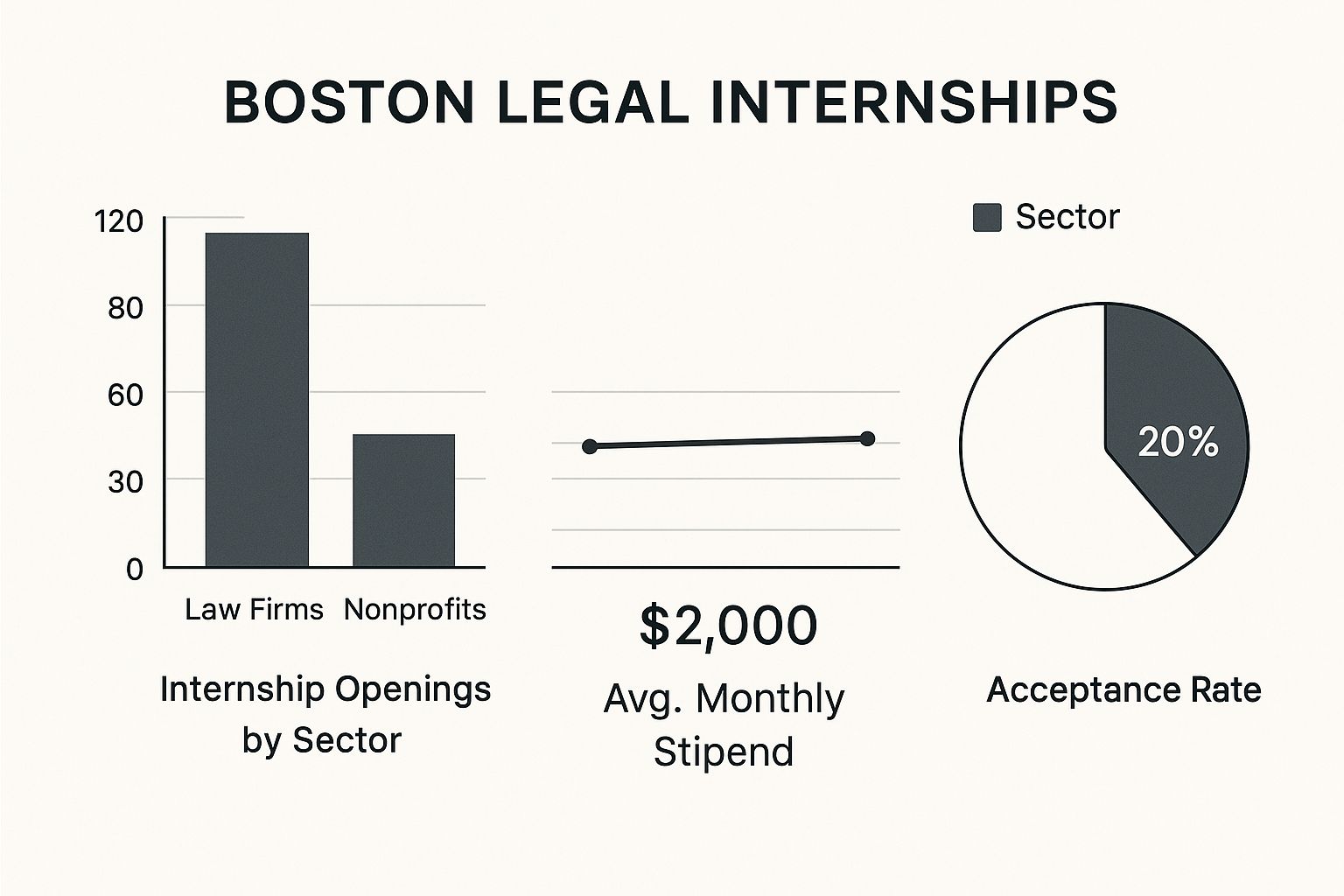
 21 minutes read
21 minutes read
Landing a top legal internship in Boston is more like a contact sport than an academic exercise. Sure, a high GPA opens doors, but it won't single-handedly get you across the finish line in this city's ridiculously dense and competitive legal scene. This isn't just about finding a summer job; it's about elbowing your way into one of the country's most sought-after legal markets.
Let's be direct. Boston is packed with prestigious firms, high-stakes government offices, and passionate non-profits, all fighting over the same pool of sharp student minds. The people on the other side of the table—the hiring managers and recruiting coordinators—spend their days sifting through mountains of resumes. Trust me, they can spot a generic, half-hearted application from across the room.
If you're just starting your search in the fall for a summer spot, you're already on the clock. The path to a Big Law summer associate gig is a different universe from securing a public interest role, and knowing where you want to land is the first, most critical step. Forget what you think you know; this is your real-world briefing on the unwritten rules.
Boston's legal internships come in a few distinct flavors, and each one operates with its own culture, timeline, and set of expectations. You can't use the same playbook for all of them. It just doesn't work.
Big Law Firms: These are the highly structured, hyper-competitive summer associate programs. Expect intense research projects, long hours, and, of course, a paycheck that makes your student loans weep with temporary relief. The recruiting cycle starts ridiculously early, and they demand perfection from day one.
Government Agencies: From the Massachusetts Attorney General’s Office to City Hall, these roles offer a direct look at the machinery of public service. The application process is often rigid, with strict, early deadlines. While the work can be incredibly substantive, the pay—or lack thereof—might mean you need to get creative with funding.
Public Interest & Non-Profits: These organizations are driven by their mission, not by profits. You'll likely get more hands-on experience here than anywhere else, working directly on cases that impact real people's lives. It's rewarding work that looks fantastic on a resume, even if it won't finance a lavish lifestyle. This path is often just as demanding and fulfilling as a traditional legal career. For a deeper dive into related roles, you might be interested in learning how to work as a paralegal to gain some foundational experience.

The real challenge isn't just finding an internship; it's finding the right one. Misunderstanding the landscape means wasting precious time on applications that were doomed from the start.
The table below offers a no-fluff comparison of the main types of legal internships in Boston to help you focus your search and tailor your applications.
| Internship Type | Typical Environment | Key Skill Development | Application Timeline |
|---|---|---|---|
| Big Law Firm | Fast-paced, corporate, highly structured. | Complex legal research, memo drafting, due diligence, professional networking. | Early Fall (OCI is a major pipeline). |
| Government Agency | Formal, bureaucratic, process-driven. | Statutory interpretation, policy analysis, regulatory compliance, litigation support. | Fall to early Winter; strict deadlines. |
| Public Interest | Collaborative, mission-focused, often resource-constrained. | Client-facing interaction, direct advocacy, community outreach, grant writing. | Winter to early Spring; more flexible. |
Understanding these differences is key. You don't want to be firing off applications for public interest roles in August when their hiring cycle hasn't even begun. That’s a rookie mistake.

The numbers make it clear: while law firms offer the most positions, the overall acceptance rate is a sobering 20%. This highlights just how intense the competition is across every single sector. Your strategy needs to be sharp from day one.

Let's get one thing straight. Sending out a blast of generic resumes is the fastest way to get ignored in this town. If you enjoy writing boilerplate cover letters for hours on end, by all means, continue. But that's not how you'll land one of the top legal internships in Boston.
Hiring managers here have a sixth sense for the copy-paste, shotgun approach. They can spot a non-committal application from a mile away, and it goes straight into the digital trash bin. To succeed, you need a scalpel, not a sledgehammer.
Your first move is to stop thinking about "legal internships" in general terms. Start thinking about the specific legal ecosystems thriving within the city. Boston isn't a monolith; it's a collection of specialized hubs, and where you focus your energy depends entirely on what you want to do.
This isn’t about just making a list; it’s about crafting a strategic plan of attack. You're aiming to build a curated list of 15-20 target opportunities, not 150. In this game, quality over quantity is the only rule that matters.

The goal isn’t to apply everywhere. The goal is to apply to the right places with an application so tailored they think it was written just for them. Because it was.
So, where do you find these golden opportunities? It’s not about scrolling aimlessly through job boards until your eyes glaze over. It's about active, intelligent reconnaissance.
Start with your law school's alumni network—this is your lowest-hanging fruit. Search for alumni working in Boston at firms or agencies that pique your interest. An email to a fellow alum is infinitely warmer than a cold application ever will be.
Next, become a power user on LinkedIn. Follow the Boston-based firms and legal organizations on your radar. See who works there, what they post about, and who they’re connected to. This is modern opposition research, and it’s critical for understanding the culture and priorities of a potential employer. You might even find it useful to check out local paralegal certification requirements to show an extra layer of commitment to the field.
Finally, don’t sleep on local government programs. They are notoriously competitive but offer unparalleled experience. The City of Boston's Summer Internship Program, for instance, places students in various departments, including legal services. It's a crash course in municipal governance that demands excellent communication and time management skills from day one.
While everyone else is fighting for a spot at the same ten big-name firms, you can find incredible experience at smaller, specialized boutique firms or lesser-known non-profits. These "hidden gems" often provide more hands-on work and direct mentorship than their larger counterparts.
Use resources like the Boston Bar Association directory to find firms specializing in niche areas like environmental law, art law, or sports and entertainment. An internship at one of these places can make you a far more interesting candidate down the road than someone who just did doc review all summer. Your curated list should be a healthy mix of reach, target, and "dark horse" opportunities that truly align with your interests.

Let's get real about your application package. Right now, your resume and cover letter are your opening argument, and I'm willing to bet they sound just like everyone else's. They’re probably littered with phrases like "detail-oriented" and "hard-working," which is exactly what the last hundred applicants said. Yawn.
Hiring partners in Boston have seen it all. They’ve read more cover letters than they can count, and their eyes glaze over at the sight of another generic template. Your job isn’t just to meet the qualifications; it’s to make your application impossible to ignore.
Forget being just another resume in the stack—you need to be the one they’re still talking about after the initial screening.
The single biggest mistake I see from law students is treating a resume like a laundry list of job duties. Nobody cares that you "answered phones" at your summer job. What they do care about is what that experience proves.
Did you handle confidential client information? Did you triage urgent calls and direct them to the right attorney? That’s the good stuff. You have to translate every single experience—moot court, a tough academic project, even that non-legal barista job—into compelling evidence that you already think like a future lawyer.
Here’s how to reframe some common experiences:
Instead of: "Participated in moot court competition."
Try: "Drafted a 30-page appellate brief and presented oral arguments, earning commendation for persuasive writing and poise under questioning."
Instead of: "Worked as a research assistant for Professor Smith."
Try: "Conducted complex legal research using Westlaw and LexisNexis on matters of constitutional law, contributing key findings to a forthcoming law review article."
Every bullet point is a piece of evidence. Make it count.

Your resume isn’t a historical record of your employment. It's a marketing document designed to sell one product: you. Each line item must answer the hiring manager's silent question, "So what?"
Now, onto the cover letter. If your opening line is some version of, "I am writing to express my interest in the legal internship position advertised on [Platform]," you’ve already lost. It’s the professional equivalent of a limp handshake.
Your cover letter has two critical jobs: to answer "Why us?" and "Why Boston?" with genuine, well-researched enthusiasm. This is where all that targeted research you did pays off. Vague flattery about a firm's "excellent reputation" is meaningless. Specificity is everything.
You need to mention a recent case they won, a partner’s article you actually read, or their commitment to a specific pro bono initiative that resonates with you. Show them you didn’t just find their name on a list; you actively chose them for a reason. This creates a narrative that makes you memorable.
To make this brutally clear, let's compare two opening paragraphs for an application to the Massachusetts Office of Consumer Affairs and Business Regulation (OCABR).
The Bland Before:
"I am writing to apply for the Legal Intern position at the Office of Consumer Affairs and Business Regulation. I am a second-year law student at Suffolk University with a demonstrated interest in public service. My coursework in administrative law and my strong research skills make me a qualified candidate for this role."
It’s fine. It’s also forgettable, boring, and tells the reader nothing they can’t already see on the resume.
The Compelling After:
"When a constituent is facing a potential Lemon Law claim, the gap between their legal rights and their ability to enforce them can feel immense. My passion for bridging that gap is what draws me to the crucial work of the OCABR. As a Suffolk Law student who has followed the agency’s consumer advocacy, I was particularly impressed by [mention a specific recent initiative], and I am eager to contribute my research skills to a team that delivers such tangible public service."
See the difference? The second version shows initiative and demonstrates genuine interest by connecting a personal motivation to the agency’s specific mission. It tells a story. That’s how you get noticed.
When you're applying for competitive legal internships in Boston, your application can’t afford to be anything less than a compelling argument for why you are the perfect fit.
Let's get one thing straight. If you think networking is just a series of awkward coffee chats, you're missing the point entirely. In a city as tight-knit as Boston's legal community, your network is the secret weapon that gets your resume moved from the digital ‘maybe’ pile to the ‘must-interview’ stack.
This isn't about firing off a slick, generic LinkedIn message and hoping for the best. That’s just transactional, and busy attorneys can smell it from a mile away. Real networking is about playing the long game—building genuine connections and being helpful long before you ever ask for anything.
Most formal networking events are a waste of time. You know the scene: you stand around, clutching a lukewarm drink, trying to make eye contact with someone who isn't already desperately looking for the exit. The real connections in Boston aren't made in those crowded rooms.
They’re forged through smarter, more targeted interactions. A far better strategy is to tap into your law school’s resources, like alumni meet-and-greets or guest lectures. These are warmer environments where you have a built-in reason to be there. Instead of a cold open, you can start with, "Professor Smith’s lecture on intellectual property was fascinating; I was particularly interested in your firm's work on…"

Your goal isn't to collect a stack of business cards. It's to have a handful of meaningful conversations that can lead to a follow-up email and, eventually, a real professional relationship. One good connection is worth a hundred flimsy ones.
Informational interviews are your golden ticket, but only if you use them correctly. The term itself is a bit of a misnomer; you’re not there to be "interviewed." You are there to ask intelligent questions and learn from someone’s experience.
Your approach is everything. Don't make it a thinly veiled plea for an internship—that's the fastest way to get shut down. Frame it as a genuine request for advice from someone whose career path you admire.
Here’s a simple email script that I've seen get responses time and again:
Subject: Suffolk Law Student Seeking Advice on Public Interest Law
Hi [Attorney's Name],
My name is [Your Name], and I am a 2L at Suffolk Law. I came across your profile on the BBA directory and was incredibly impressed by your work with [Specific Organization or Case].
As I explore a career in public interest law in Boston, your path is one I hope to emulate. If you have 15 minutes to spare in the coming weeks, I would be grateful for the chance to hear about your experience and any advice you might have for a student starting out.
Thank you for your time and consideration.
Best,
[Your Name]
This works because it’s specific, it respects their time, and it focuses on them, not you. It proves you’ve actually done your homework.
Landing that informational chat is just the beginning. The follow-up is where you actually build the relationship and stay on their radar without becoming a pest.
Of course, your immediate follow-up should be a simple thank-you email sent the same day. But the real magic happens weeks or even months later.
These small, thoughtful gestures are what turn a one-time meeting into a lasting professional connection. It shows you were listening and that you value their insight. This is how you build a network that will not only help you find one of the best legal internships in Boston but will also support you throughout your entire career. It isn't about being fake; it’s about being strategically genuine.

Alright, you got the interview. First, take a breath and give yourself a high-five—you’ve already made it past the toughest cut. Now it’s time to seal the deal.
This is where all your research and careful application prep come together. But if you're just prepping answers for "What's your greatest weakness?" you're setting yourself up for failure. Legal employers in Boston, from white-shoe firms to public defenders, want to see how you think, not how well you’ve memorized generic answers.
They don’t need another "hard worker." They need to see your judgment in real-time.
Get comfortable telling stories, because you’re about to do a lot of it. Boston interviewers lean heavily on behavioral questions. They're trying to see how you’ve handled things in the past to predict how you’ll perform in the future. Expect questions about dealing with a difficult colleague, juggling tight deadlines, or how you recovered after making a mistake.
The absolute worst response is to just wing it and ramble. The secret is to walk in with a "story bank" already prepared.
Think of this as your personal arsenal of concise, compelling examples from your past work, classes, or even volunteer experience. For every story, you need to be able to hit four key points clearly using the STAR method (Situation, Task, Action, Result).
Have three to five of these stories polished and ready. You’ll be surprised how you can adapt them to fit almost any behavioral question that comes your way. For a deeper dive, check out this guide on legal assistant interview questions, which often cover the same scenarios you'll face as an intern.

A well-prepared story isn't just an answer; it's evidence. You're not just telling them you're competent—you're proving it with a real-world example they can't ignore.
I can't tell you how many great candidates I've seen fall flat because of a weak follow-up—or no follow-up at all. A quick "Thank you for your time" email is the bare minimum. Frankly, it’s just table stakes. It won’t hurt you, but it definitely won’t help you stand out.
Your thank-you note is your last chance to make your case. It’s more than just good manners; it's a strategic move to reinforce your value and prove you were paying attention.
A truly effective follow-up note does three things:
This is especially true for public interest internships. When you're interviewing for one of the coveted legal internships in Boston at a place like Greater Boston Legal Services (GBLS), your passion for the mission is non-negotiable. They need to see that you get it. You can learn more about GBLS's internship opportunities to see the kind of critical work they do in areas from housing to immigration law.
A thoughtful thank-you note that echoes their mission-driven language can be the very thing that pushes your file from the "maybe" pile to the "offer" pile. It's the final, crucial step that far too many people skip. Don’t be one of them.
Alright, let's get right into the questions that are probably on your mind. You know the Boston legal scene is competitive, but you need some straight answers to navigate it. Here’s a practical, no-BS look at the most common things students ask when trying to land an internship here.
If you're reading this in the spring and hoping for a summer spot, you're already behind the eight ball. For the most sought-after legal internships in Boston, especially at larger firms and government agencies, the process kicks off in the late summer or early fall of the year before you'd even start.
It's not an exaggeration. While you were enjoying your August break, many of your peers were already deep into resume polishing and networking. That’s just how the recruiting cycle works in a competitive market like this one.

Thinking you can casually apply in April for a top-tier summer role is like showing up to the Boston Marathon an hour late and expecting to place. The real race for those positions began months ago.
Take the Massachusetts Attorney General’s Office Summer Legal Intern Program, a fantastic and highly competitive opportunity. For their Summer 2024 program, applications opened on November 18 and closed on January 3. This isn't a casual affair; it’s a structured process that rewards planning. You can see their demanding timeline and program details for yourself to get a sense of how far in advance you need to think.
This is always a big one. The answer is a classic legal "it depends," but the landscape is fairly predictable.
The key takeaway? Never assume. Read every posting carefully. If a role you love is unpaid, your very next stop should be your law school's career services or public interest office to talk about funding.
Let's be direct: it definitely helps. Going to a local school like Harvard, BU, BC, Northeastern, or Suffolk gives you a clear home-field advantage. You’re plugged into a dense local alumni network, and your career services office has deep-rooted connections with area employers.
But is it a deal-breaker if you're coming from out of state? Not at all. It just means you have to work a bit harder to prove your commitment to Boston.
Your "Why Boston?" story can't just be a line in your cover letter; it needs to be a core part of your application narrative. You need solid answers to questions like:
If your interest seems generic, employers will likely favor a local candidate who has already demonstrated a clear desire to build their career in Boston.
Finding the right legal talent shouldn't feel like a full-time job. At HireParalegals, we connect US law firms with a network of over 10,000 pre-vetted remote legal professionals, cutting your hiring time to as little as 24 hours. Discover how you can reduce payroll costs by up to 80% and scale your firm on-demand.